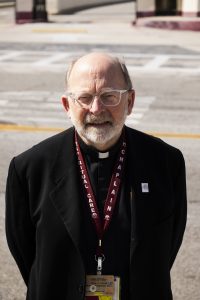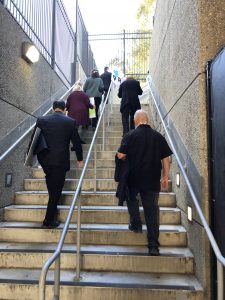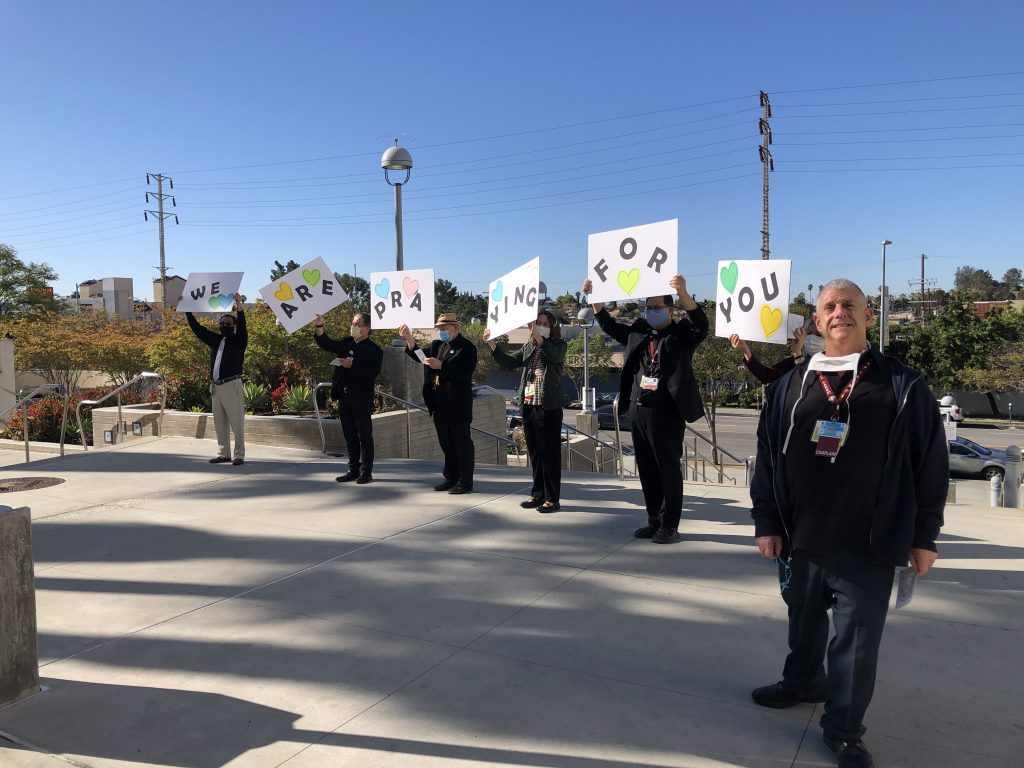When asked if ministering to patients with the coronavirus (COVID-19) at St. John’s Regional Medical Center in Ventura and St. John’s Hospital in Camarillo was different from other patients, chaplains Father Calin Tamiian and Veronica Marchese needed a moment to explain.
“Yes and no at the same time,” Father Tamiian answered during a teleconference interview. The coronavirus, he explained, is just one of the types of contagious diseases that chaplains are trained to confront in their field of ministry.
But for the 45-year-old Eastern Rite Catholic priest, one of the most important parts of chaplaincy is “the feeling touch of the ministry.”
“That hand on the shoulder that you see in hospitals, that is not available now. We minimize exposure for the benefit of the patients as well as for the benefit of the staff. That’s what we’re doing every day — assessing the risks and assessing what we can do.”
Father Tamiian, who has been a chaplain for almost 20 years (18 of them at the St. John’s Hospitals in Ventura County), has seen how every hospitalization takes individuals out of the regular environment and into an enclosed community of strangers.
But what’s especially alarming for coronavirus patients is that they are also immediately put into isolation. To make matters more ominous, the way the men and women who attend to them are outfitted — wearing hooded protective gowns, goggles, masks, gloves, and a clear plastic shield protecting their faces — often resembles something out of a “Star Wars” movie.
Father Tamiian’s experience is similar to that of several chaplains ministering to coronavirus patients from around the Archdiocese of Los Angeles that Angelus spoke to: trying to find innovative ways of bringing Christ’s presence to patients who are deprived of physical contact with others, while ministering to the spiritual needs of loved ones often in agony.
“How about you, Veronica?” the chaplain asked his colleague.
“There’s a lot of stress on families right now,” Marchese replied. “At this point, we’re being very careful, utilizing the phone to support them instead of having face-to-face conversations because they can’t come into the hospital, where before, families would be able to be here all day long at the bedside of their loved one.”
The fear of their loved ones feeling abandoned, Marchese said, has led to families and medical workers to look for ways to “create those bridges to facilitate communication between the family and the nurses.”
Families who are more familiar with mobile technology like smartphones and iPads are using them to communicate with patients. But, Marchese admitted, “it’s hard for those who don’t have that capability.”
The priest said his coworker had brought up a crucial issue when ministering to severe COVID-19 cases. “There’s also the reality of grief, and that’s another reason why we are here as Catholic chaplains,” he pointed out. “To address the feeling of loss. COVID-19 has complicated the grief. So we see more and more complex grieving situations, when family members can’t see their loved one as a patient.”
While there are still 13 chaplains on staff, covering the two hospitals, the 70-some volunteers who normally worked with them can no longer go inside the facilities, including the extraordinary ministers of holy Communion who bring Communion to patients on different wards. So staff chaplains are pulling long hours ministering to incoming COVID-19 cases as well as regular patients.
“Just being in the hospital affects people’s deeper reliance on what their values are and what their understanding of God and what their relationship with God is,” noted Marchese. “So I think anytime that someone comes to the hospital, they’re in a vulnerable place. They’re open to really evaluating their lives. People have that deeper understanding of what life is all about.
“So it’s one of our opportunities for evangelization, because people connect to what their limits are as a human being — and what is beyond that.”

Father Chris Ponnet has been a chaplain at Los Angeles County+USC Medical Center, commonly known as “County” among locals, for 25 years. The hospital near East LA has seen COVID-19 patients “from the beginning” of the virus’ arrival to Southern California roughly two months ago. But in the last month, he has seen the number of patients at the hospital, which serves some of LA’s poorest, actually decrease.
As of mid-April, the hospital was still in “triage mode” in preparation for a surge of COVID-19 patients. “Administrators have been sending regular patients not infected to other hospitals like the boat in the harbor,” he explained.
Still, priests and hospital staff have found ways to provide anointing and confessions as needed to patients, Father Ponnet said.
“With anointings, we would normally just go right into a room. I did a couple with COVID-19 cases early on. But then as we’ve moved along, we’re more and more doing that virtually. So we stand outside the room: pray with the person over the phone, and we’re hoping soon to move that to iPads so that the visualization will be better.”
But if the person is dying, the “last rites” and the anointing of the sick are still administered while taking precautions. Father Ponnet and the other chaplains wear a gown, gloves, masks, and goggles, with a clear plastic shield around their faces. Then they pour some of the consecrated oil on a tissue and anoint the person’s forehead (the tissue is destroyed soon after). Ordinarily, chaplains would pour a little oil on a finger and then anoint the person.
The most serious, and often deadly, bodily effect of the coronavirus is the difficulty of breathing it causes for patients. But Father Ponnet, who also serves as pastor of nearby St. Camillus Church, has seen up close how it can also affect the soul, including in a positive way.
“Clearly, I would say anxiety is a huge human experience right now. And that affects people spiritually,” the 62-year-old priest said. “So a whole lot of what chaplains do across the country right now with COVID-19 cases is we’re just spending more time with staff trying to be an instrument of calming as well as with patients and families.
“You know, as long as people use universal precautions, there’s hardly any way that this can be passed along. You put up enough barriers and it can’t be passed just by osmosis.”
In the case that a “surge” or “second wave” does arrive, Father Ponnet and the hospital’s other chaplains will be ready: They’ve divided into three separate groups, so that if a member of one group gets infected, and that team has to be isolated, the other two can step into the breach.
Amid all the uncertainty, Father Ponnet said the pandemic crisis has served to raise “the big spiritual questions” of life and death not only among patients, but staff as well.
“People are asking both the personal question of their own health and the arbitrariness of one person versus another member of their family being infected,” said the veteran chaplain. “But they’re asking more often, ‘Why is God allowing this to happen? Is there something global, and God is punishing the world?’ ”
The consequences are not necessarily always tragic.
“I find with the medical staff, there’s a sense of when you’re in this kind of high triage mode — or some people would call it a war mode — it does bring people together. And I find people asking for prayer, individually or as a group.”

Father Timothy Bushy was only on the job as regional spiritual health officer for Southern California at Providence St. Joseph Health system for three weeks when the coronavirus took on the form of a full-blown pandemic here.
“Talk about baptism by fire,” quipped the priest, originally from the Diocese of Crookston, Minnesota.
After working in health care the last 13 years, his new job is to provide leadership and strategic direction for all acute-care ministries in the system’s local hospitals.
He finds it providential that the network managed last year to launch “Providence TeleHealth,” before the coronavirus appeared in China and began its spread across the globe.
“We are providing spiritual care via technology,” Father Bushy told Angelus when asked to explain the initiative. “It can be cellphones, iPads directly to the patient. However, with COVID-19, patients are oftentimes on ventilators and can’t speak. We make connections with their families.”
Then he offered an example.
About a week ago, a Catholic patient suffering with the coronavirus was on a ventilator at one of Providence St. Joseph Health’s local hospitals, so he could not communicate verbally.
Although the chaplain explained that Pope Francis had authorized the granting of a plenary indulgence under certain conditions to Catholics who are victims of the coronavirus, the family wanted their loved one to see a priest. A nurse with a cellphone connected two family members and a priest outside of the ICU with the patient through FaceTime. The cleric then prayed the Commendation of the Dying.
When asked whether the family was satisfied, Father Bushy answered, “I’ll tell you. They were just ecstatic to see the patient, their loved one. But also to pray. And the priest did an exemplary job explaining what this was about, how it had been approved by the USCCB [United States Conference of Catholic Bishops] and the Archdiocese of Los Angeles.
“It was sort of catechetical because a lot of people haven’t heard about this,” said Father Bushy. “So it’s catechetical and also healing. And the family expressed their sincere gratitude to the priest who provided that spiritual care for them and their loved one.”
At the daily noon Mass streamed to hospital rooms, the prayer of spiritual communion was also being recited at St. John’s Hospitals for patients wishing to receive the Eucharist.
“The Sisters of Providence and the Sisters of St. Joseph of Orange have always told us to respond to the sign of the times,” reminded the priest. “And using this technology is a perfect example of the way in which our chaplains are responding to the signs of the time as expressions of the love of God.”

